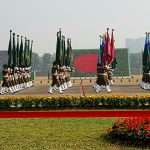On This Day Indian Navy Completely Destroyed The Karachi Harbour In 1971 War
Indian Navy is one of most potent maritime forces in the world and certainly most lethal in Indian Ocean. But this reputation hasn’t been forged in a year or two, it has taken over seventy decades to make Indian Navy, a force that strikes fear in the heart of the enemies.
Today is Navy Day, a day Indian Navy with the rest of the armed forces celebrates to commemorate the historic ‘Operation Trident’ which destroyed Karachi harbour on the night of December 4, 1971, incurring huge losses to the Pakistani Navy while making sure that Pakistan Navy doesn’t stand a chance to attack any of the Indian naval bases.
But along with a tale of supreme success, it’s also a story of two friends of Bengaluru who joined navy together and luckily both became part of this heroic operation which seal India’s maritime security in the war of 1971.
But first, let’s know what was ‘Operation Trident’ ::
‘Operation Trident’ was launched on night of December 4, 1971, when Indian Navy bombarded the Karachi harbour incurring huge losses to the Pakistani Navy. To commemorate the historic operation, the day is observed as Indian Navy Day annually.
Indian Navy sank four Pakistani vessels and ravaged the Karachi harbour fuel fields, killing over 500 Pakistani Navy personnel. Three missile boats of the Indian Navy, INS Nipat, INS Nirghat and INS Veer, played a pivotal role in the attack.
Two buddies who obliterated Karachi harbour ::
S Sundar Raj and Suresh Bangara had joined navy in 1966 as second lieutenants. But with only five years into their service, they were thrown into the biggest test of their lives as both friends were part of this historic operation 45 years ago.
“Around 2 pm on December 4, 1971, our fleet sailed from Okha Port in Gujarat, towards Pakistani waters following orders to attack the Karachi port, the stronghold of the Pakistani Navy,” reminisced Sundar Raj, the veteran at his Byappanahalli home who was second in command at INS Nipat.
The fleet reached 70 miles south of Karachi around 10.30 pm and was ready for combat. Raj remembers seeing a blip on the radar, which indicated an enemy vessel which was closing in.
“The orders to engage were given and we fired the first missile. We saw it hit the vessel but it was still floating. Then we fired the second one and sunk the ship, which we later came to know was Pakistani destroyer PNS Khaibar,” added the National College alumnus.
As the Indian Navy advanced, Pakistani vessels too approached to defend the Karach harbour, INS Veer fired its first missile onto Pakistani vessel Muhafiz, a minesweeper, sinking it with the entire crew.
“We had rehearsed the attack numerous times as war situation was rife. We were thrilled to attack the enemy at its den,” recalled 70-year-old Suresh Bangara, a Benson Town resident and a St Joseph’s College passout, who was then a 25-year-old lieutenant at Veer.
With 90 minutes, Indian warships fired six missiles which resulted in sinking four enemy vessels including a cargo ship carrying ammunition and destroyed the fuel storage facility at the Karachi harbour, before successfully returning to Mumbai without a single Indian casualty.
“As we were returning to Mumbai, one sailor climbed up the missile hanger on Nipat and wrote ‘killers’ on it in red paint, which was emphatically received by the successful crew,” added Bangara. The squadron was thereafter christened ‘The Killers’ and a Killer Day has been celebrated by the Indian Navy on December 3 ever since.
Sundar and Suresh were decorated with Nao Sena Medal and Mention in Dispatches certificate respectively for gallantry. The two friends retired from service in 2006 (Sundar as rear admiral and Suresh as vice admiral).
CREDIT : http://www.defencenews.in/





